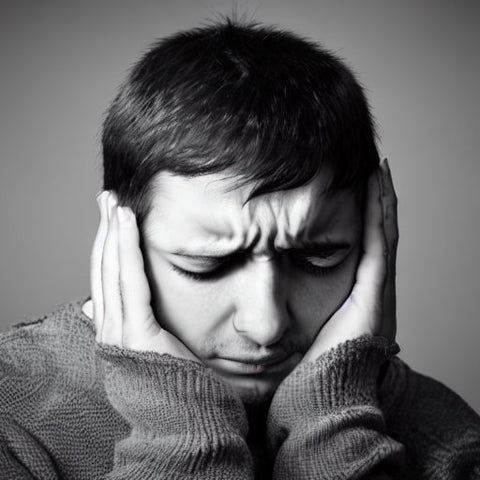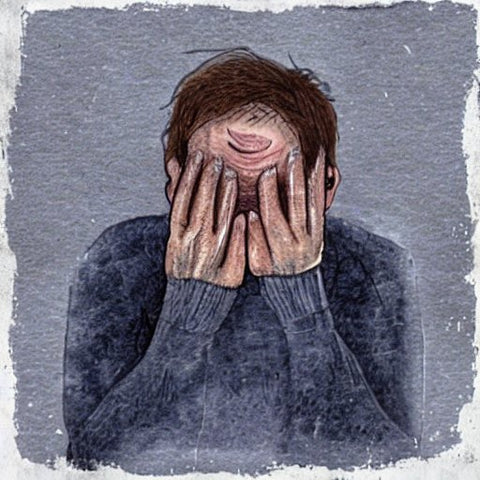Why Do I Feel Like This?
There are a lot of different things you may do to figure out why you are sad, and if you are having difficulties doing that, you have a lot of options. Either you may make an effort to concentrate on the factors that led to the issue as opposed to the reasons why it occurred, or you can reach out to the people who care about you and attempt to assist them in comprehending what you are going through.
Reasons that may cause depression:
- Biological factors: Changes in the brain chemistry or genetics may both play a role in the development of depression. In addition to hormonal abnormalities, chronic disease, and the use of certain drugs, depression may also be caused or contributed to by other factors.
- Psychological factors: Depression may be caused by a number of psychological reasons, including traumatic experiences, stress, and disputes that have not been addressed. Other factors that might play a role in the development of depression include habits of negative thinking, poor self-esteem, and perfectionism.
- Social factors: Isolation from others, difficulties in interpersonal relationships, and financial strain are all examples of social variables that may lead to depression. A lack of support from friends and family, as well as exposure to violent or abusive situations, may all contribute to an increased risk of developing depression.
- Environmental factors: Pollution, noise, and light pollution may all have an effect on one's mood and raise the likelihood of developing depression. The experience of traumatic events, such as those brought on by war or natural catastrophes, may also play a role in the development of depression.
- Life events: Depression may be caused by a number of life events, including the death of a loved one, the loss of a job, or other significant life changes. There are a number of factors that may play a role in the development of depression. Some of these factors include chronic stresses such as financial troubles or long-term unemployment.
Biological differences
Depression is a severe mental condition that impacts the lives of millions of individuals all over the globe. The symptoms vary from feeling down to having no drive at all. The individual who is suffering from this illness not only has a greater risk of developing bodily issues, but also has their living status deteriorate as a result.
Both chemical and genetic changes in the brain may play a role in the development of depressive symptoms. Depression may be caused by chemical imbalances in the brain, such as those that occur when serotonin and dopamine levels are out of whack, which is one of the brain's many important functions. In addition, research has indicated that individuals who come from families with a history of depression are at an increased risk for developing the disorder themselves.
There is some evidence that hormonal abnormalities, such as those that might occur during pregnancy or the menopause, may potentially play a role in the onset of depressive symptoms. Chronic conditions such as heart disease, diabetes, and cancer may all raise the risk of depression since they can induce changes in a person's physical state as well as their emotional state and cognitive state. A side effect of several drugs is depression, which may potentially be a contributor to the development of depression.

It is believed that depression is the result of a complicated interplay between biological variables and environmental stimuli. There is a school of thought among experts that hereditary factors are to blame for depression. Some people believe that psychological issues play a more important role than physical ones.
According to the consensus of scientific opinion, depression results from an imbalance of neurotransmitters in the brain. Dopamine, norepinephrine, and serotonin are a few examples of these chemicals. These are brain chemicals that are produced by the brain on their own and allow for communication between neurons. Investigations into the specific functions of these neurotransmitters are still ongoing.
Researchers have discovered that persons who suffer from depression have nerve cells that are smaller in size and have less of them than those who do not suffer from depression. Patients diagnosed with depression have been reported to have hippocampus volumes that are smaller. This might be the cause of the cognitive fog.
There is some evidence that gender is a factor in the development of depression. According to a number of studies, the likelihood of a woman developing depression is two times higher than that of a man. However, researchers have not yet established whether this disparity may be attributed to gender inequity or to variables that are rooted in social norms.
There is a growing amount of research that shows that depression is the consequence of a mix of hereditary characteristics and environmental influences. The chromosome 3p25-26, which is connected with depression, was found to be present in around forty percent of individuals with the condition, according to a research that looked at 800 families with a history of recurrent depression.
Your career may be causing you stress and a lack of satisfaction
There are a lot of things in life that might make you stressed out. It is possible that your mental health may suffer if you are employed in a position that you do not find satisfying.
Taking measures to alleviate the stress caused by work is the first step in managing this issue. Employers have the ability to institute a policy for the management of stress. Additionally, they have the option of establishing an employee aid program. There are certain businesses that provide recommendations to specialists in the field of mental health.
Communicating with loved ones and close friends is another essential step to take. They will be able to assist you in determining the source of your anxiety.
Counselors are able to help clients by instructing them on methods for effectively regulating their feelings. Techniques like as mindfulness, body scanning, and interrupting your train of thinking are examples of this.
You may be able to find solutions for stress management in other aspects of your life as well. For instance, if you eat well and get enough exercise, you'll find it easier to unwind. You may plan to do challenging activities first thing in the morning, giving you more time in the afternoon for your interests and your family.
The development of effective coping skills, the implementation of a stress management strategy, and the engagement of the services of a professional counselor are some more options that you may investigate. However, you won't be able to benefit from these tactics unless you're willing to consider the possibility of assisting yourself.
If you are coping with stress and sadness at work, seeing a therapist may prove to be a helpful resource for you. They are able to assist you in determining the best way to deal with it and forward with your life.
Last but not least, a stressful work can just be a symptom of a broader, more significant issue. It's possible that you're more likely to feel stressed out if you have a pre-existing physical or mental health issue that's been going on for a while.
Life's happenings
Depression is a common mental health condition that may be brought on by significant life events such as the death of a loved one, the termination of one's employment, or other significant life upheavals. There are a number of factors that may play a role in the development of depression. Some of these factors include chronic stresses such as financial troubles or long-term unemployment. Significant shifts in a person's life may be brought on by a variety of life experiences, and it can be challenging to readjust to these shifts. For example, the death of a loved one might bring on emotions of sorrow and grief that are difficult to get over.
Sleep deprivation
It's possible that a lack of sleep might have some pretty negative impacts on your mental health. According to a number of studies, those who do not get enough sleep report increased levels of both anxiety and sadness.
The effects of not getting enough sleep may last for weeks, months, or even years. Memory, emotion, and performance are all susceptible to being influenced by it. Inadequate sleep has been linked to both an increase in the chance of developing heart disease as well as an increase in blood pressure.
People who don't get enough sleep are more likely to be hypersensitive to the sensation of pain. In addition to this, their levels of the hormone melatonin, which controls both sleep and mood, are lower.
Insomnia, night terrors, and nightmares are among potential side effects that may occur in those who suffer from chronic sleep deprivation. They are at a significantly elevated risk for both depression and thoughts of suicide.
You may be able to manage part of your sleep deprivation on your own, but if you observe changes in the way that you normally sleep, you should see a medical professional. If you do not have a consistent pattern of getting enough sleep, your healthcare physician may suggest making adjustments to your lifestyle or medicine.
A significant number of depressed people have unpredictable patterns of sleep. This might lead to a never-ending loop. Sleep deprivation may often exacerbate symptoms of mental illness, including irritability, irritability, and depression.
According to the findings of one research, those who have ongoing sleep issues have an increased chance of taking their own lives. It is possible to get a prescription for medicines that lengthen the amount of time spent sleeping. However, there are some drugs that have been shown to cause sleep problems.
Insomnia is a relatively prevalent illness that people struggle with. Between 50 and 70 million individuals in the United States fulfill the medical requirements for it.
Aspects of a Person's Mental Makeup
Trauma, stress, and disputes that are not addressed may all contribute to the development of depression. Other factors that might play a role in the development of depression include habits of negative thinking, poor self-esteem, and perfectionism. It is possible for traumatic experiences, such as abuse or neglect in childhood, to alter the way the brain processes emotions, so raising the risk of developing depression. The beginning of depression may also be hastened by traumatic experiences, such as the loss of a job, difficulty in interpersonal relationships, or challenges in managing one's finances.
Sunlight and its irradiation
A recent research that was carried out in South Korea reveals that exposure to sunshine may help relieve symptoms of depression. The study looked at information from 5490 depressed individuals who were receiving treatment in hospitals. The cognitive function of the study participants was analyzed with the use of a validated six-item screener questionnaire. According to the findings, the daily average amount of sunshine over the preceding 30 days was correlated with a reduction in the incidence of depressive illnesses.
Previous research has shown a beneficial association between time spent in the sun and lower incidence of major depressive disorder. It would suggest that alterations in the neurological system are the intermediary in this interaction. A decrease in melatonin synthesis is connected with feelings of exhaustion and irritation, whereas an increase in serotonin production is associated with a reduction in depressive symptoms over the short term.
However, there isn't much of a clear connection between more sun exposure and lower rates of suicide. Some research have revealed a negative relationship between the two, while other investigations have concluded that there is no meaningful impact. There are a lot of different things that might be the cause of the disparity.
There is a chance that exposure to low amounts of light triggers an increase in the body's production of the hormone melatonin, which is responsible for inducing sleepiness. Melatonin production is increased in sad people, which may have a negative impact on both their mood and their ability to sleep.
Memory is one of the cognitive skills that may be helped by the environment's level of lighting, as well as other cognitive functions. In addition, research has shown that being exposed to natural light may help lower feelings of despair and the risk of suicide.
The results of this research demonstrate the existence of a bimodal impact, which becomes more pronounced whenever there is a shift in the seasons. In the future, researchers will identify which circumstances have favorable impacts of sunshine on mental health, and which circumstances have detrimental consequences.
Make contact with those who are concerned about you
It is not always easy to know how to provide assistance to a loved one who is experiencing depression. The reality is that you do not need to be a licensed mental health professional. Having someone who can guide you through determining the most effective routes of action may be quite beneficial.
There are a variety of approaches you may use to inspire the person you care about to live a better lifestyle. Being a good example for others is one method. Putting yourself and your needs first is a great way to set an example for others to follow. This will give you the energy to serve others.
Discovering a person with whom you can have a face-to-face conversation is yet another sound suggestion. Direct interaction with another person is really beneficial for someone who is struggling with depression. Talking to someone else as they engage in an activity that brings them pleasure is another effective diversion.

It is not uncommon for individuals to have feelings of being overpowered by their circumstances. Taking time out of your busy schedule to tend to your own requirements might help reduce the amount of strain you are placing on a loved one.
Make sure to reassure the person you care about that you will always be there for them. Living with depression is draining and difficult for everyone involved in the situation. Your loved one's ability to recover from depression will be aided by your assistance in keeping them on their prescription regimen.
In addition to urging the person you care about to get in touch with you, make sure you don't take on too much and exhaust yourself. It's possible that you'll need to cut back on the amount of assistance you provide if your loved one is still able to function relatively normally.
How to Help a Loved One Who Is Struggling with Depression
When you are sad, it may be difficult to concentrate on your job and much more difficult to find the drive to accomplish anything at all. The good news is that there are a variety of therapy choices from which you may choose the one that works best for you. A loved one who is depressed may be difficult to deal with, but there are certain steps you can do to make the situation easier for yourself.
Having the perspective that no one's life is ideal
Aside from the really discouraging work of striving to live the ideal life, there is no ignoring the truth that people are not flawless. This is a fact that cannot be denied. As a consequence of this, it is inevitable that we will commit a few gaffes along the road. Your life may be filled with nasty trolls and unpleasant employers, but thankfully, there are a number of tactics you may use to lessen their presence. Having a "no bs" attitude is one tactic that may be used in this context. Because of this, you should always keep in mind that a grin has the potential to be the key that unlocks a happier new self.
Even if the situation described above is not an exact science, putting in just a little bit of extra time and effort may pay off in a big manner. For instance, you can come to the conclusion that you are not a morning person. If this is the case, it is a good idea to rearrange your schedule so that there is time for you to nap. In addition to avoiding tedious work, you also have the option of adding a few more hours to your calendar so that you may spend quality time with the people you care about the most. The important thing is to make the most of your spare time by giving it purpose and meaning. You will become a more successful and well-rounded person if you pull yourself together and get your life in order. Also, make it a point to celebrate the occasion with yourself and give yourself a reward for your hard work.
Avoidance of familiar faces
The avoidance of other people is one of the primary contributors of depression. This might result in a life that is less satisfying and joyful overall. A traumatic experience is another potential cause of this condition. If you believe that you need assistance with this matter, you should seek the advice of a professional.
According to research, depressed symptoms are linked to social contacts, while pleasant social interactions have been shown to boost mood. In addition, being exposed to dysfunctional attitudes may lead to social influence, which adds to the development of further symptoms of depression.
There are a variety of factors that could lead someone to shun their friends. They could also suffer from social anxiety or a sense of inferiority. A lack of time or money is yet another potential explanation for this. It is essential to acknowledge that avoiding something is a habit, regardless of the reasons behind it.
There are a few different approaches that you might use if you want to avoid something. To begin, you need to devise a method of communication that does not include your close buddy. You may, for instance, choose to jot down your ideas, communicate them by text or email, or all three.
You have the option of requesting help from your buddy in the event that you do need to address anything with them. You might also seek the assistance of a therapist to guide you through the resolution of the issue.
Overcoming depression is a challenging position to be in. The day may be made much better with even just a few simple adjustments, which is the good news.
Avoidance of unpleasant mental states, emotional experiences, and/or environmental circumstances
Avoidance is one of the most typical symptoms of post-traumatic stress disorder (PTSD), which is an acronym for post-traumatic stress disorder. When someone is suffering from avoidance, they may try to avoid thoughts, emotions, and even external stimuli that remind them of a traumatic experience from their past. A woman who has been raped and has gone through a terrible event may, for instance, acquire a high alarm response to the color red, whether it be a red clothing, a red automobile, or red gasoline. When something is avoided, it may present itself as a wish to forget about it entirely. This is one kind of avoidance.
The fact that a person does not feel at ease in a certain circumstance is likely the primary factor contributing to their decision to avoid being in that circumstance. For example, a war veteran who has been exposed to a terrible event would avoid going on social networking sites or watching the news in order to protect themselves from more distress. In addition, a traumatic experience might leave a person feeling emotionally numb, which can be very difficult to recover from. This might be seen as a lack of desire to mingle with other people or even to feel cheerful, which has the opposite impact of what was intended.
The effect that avoiding things has on one's relationships is another factor that should not be overlooked. It's possible for a partner, whether it be a spouse or a significant other, to start questioning how severe their partner's depressed symptoms are or to feel annoyed by their partner's inability to manage. A further possibility is that the patient's level of worry will get much worse as a result of their avoidance.
Expenditure of energy
Depression often manifests itself in the form of a deficiency of energy. This occurs for a number of different causes. There is a correlation between certain of them and other health issues. Whether you are feeling tired all the time, you should make an appointment with your primary care physician to find out if there is anything else going on.
One of the most prevalent forms of mental disease is depression. [Case in point:] [Case in point:] In point of fact, more than one in ten people in the United States have had this experience at some time in their lives. The symptoms might linger for two weeks or more, and they could make it difficult for you to go about your normal life.
Problems falling asleep and staying asleep are common symptoms of depression. A lack of sleep makes the symptoms of depression much more severe. Your physical health and mental health both benefit from getting an adequate amount of sleep.
There are many different approaches that may be used to address your depression. It is possible that you may need to take medicine or participate in treatment in order to treat the severity of your disease. Having someone or something to lean on is also beneficial. You may try using a white noise generator or going to a room that is very silent.
It is essential to maintain a healthy diet. Your body will feel better and have more energy if you eat foods that are rich in nutrients. Consuming excessive quantities of sugar or fat might lead to a feeling of exhaustion.
In addition to being an excellent source of energy, exercise is also fun. However, you may have to determine the order of your demands.
A lack of attention, motivation, and energy is avoided
This is not to imply that you can't have both, but rather that you need to approach it in a strategic manner. If you're not, people will look at you in the wrong way for the wrong reasons to be interested in you. The encouraging news is that you do not have to give in to your depression and allow it to control your life. To aid you in reaching your full potential and realizing your goals, you may also seek the support of a mental health expert. If you are prepared to go a little bit further, you will find that those who suffer from depression have access to a wealth of resources, both online and offline. The challenges associated with depression are, for the most part, mostly mental in nature. The vast majority of individuals have the capacity to recognize and address these issues, but the most effective strategy is to be proactive rather than reactive. Creating a list of your primary issues and setting up frequent checkpoints along the road is one method for accomplishing this goal.
Treatment
Depression is a significant mental health disorder that may manifest itself in persons of all ages. It has the potential to disrupt your regular life, including your employment and the connections you have. Depression, thankfully, is something that can be addressed.
If your depression is just minor, you should be able to control it with medicine and some adjustments to your lifestyle. In more serious situations, it is possible that you may need to see a therapist.
It may not always be simple to get treatment, but you should know that you are not the only one going through this. There is a wide variety of care accessible, including traditional medical care, alternative treatments, and mental services.
You should also stay away from medicines used for recreational purposes. In spite of the fact that they may provide the impression of helping you feel better, they really make the symptoms of depression worse.
Cognitive behavior therapy is an additional treatment option. The goal of this treatment is to change one's thinking patterns from negative to positive.
Medication may be an effective means of treating depression; however, its usage for an extended period of time is not advised. Modifications to one's way of life, in combination with the usage of certain drugs, have been shown to provide the best results.
Your therapist will be able to provide you with information on the treatment options that are suitable for you. Talk therapy, a computer software, online sessions, and online movies are some of the available alternatives. On the other hand, insurance companies do not often cover every treatment for depression.
If your depression is caused by a medical condition, you should consult with your primary care physician before making any decisions on treatment. During the examination, your healthcare provider will inquire about your thoughts, patterns of behavior, and symptoms. After that, he or she will devise a strategy just for you.
Dealing with a family member who is depressed
Having to deal with a sad family member may be a trying experience at times. However, there are solutions to make the circumstances less difficult. People who are afflicted with depression may get assistance in the form of support groups and other services from a variety of organizations.
When you are attempting to assist a loved one in managing the symptoms of a mental illness, it is imperative that you establish clear boundaries. This has the potential to prevent feelings of exhaustion and anger from developing.
You should not make an effort to modify the behavior of someone you care about since this will only result in a conflict-filled exchange. Instead, you should show them that you support them and urge them to receive the necessary therapy.

When you are attempting to help a loved one who is struggling with a mental illness, one of the most important things you can do is to be an attentive listener. When someone is depressed, it may be quite therapeutic to listen to someone else talk about their feelings.
Consider having a conversation with a close friend or member of your family if you do not know how to go with this matter. You should strive to find someone who will listen to you without passing judgment.
You might also be of assistance by offering to help your loved one remember to take their meds and attend their appointments. One of the most important things you can do to help a loved one recover is to get them to visit a medical or mental health expert.
























































Dejar un comentario